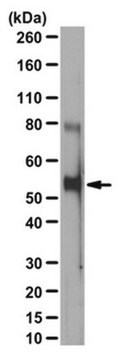MABC34
Anti-Beclin-1 Antibody, clone 9A1.1
clone 9A1.1, from mouse
Synonym(s):
Beclin-1, Coiled-coil myosin-like BCL2-interacting protein, Protein GT197
About This Item
Recommended Products
biological source
mouse
Quality Level
antibody form
purified immunoglobulin
antibody product type
primary antibodies
clone
9A1.1, monoclonal
species reactivity
human
packaging
antibody small pack of 25 μg
technique(s)
flow cytometry: suitable
immunohistochemistry: suitable (paraffin)
western blot: suitable
isotype
IgG2aκ
NCBI accession no.
UniProt accession no.
shipped in
ambient
storage temp.
2-8°C
target post-translational modification
unmodified
Gene Information
human ... BECN1(8678)
General description
Immunogen
Application
Flow Cytometry Analysis: 1 µg from a representative lot detected Beclin-1 in HeLa cells.
Apoptosis & Cancer
Apoptosis - Additional
Quality
Western Blot Analysis: 0.5 µg/mL of this antibody detected Beclin-1 in 10 µg of Raji cell lysate.
Target description
Linkage
Physical form
Storage and Stability
Analysis Note
Raji cell lysate
Other Notes
Disclaimer
Not finding the right product?
Try our Product Selector Tool.
recommended
Certificates of Analysis (COA)
Search for Certificates of Analysis (COA) by entering the products Lot/Batch Number. Lot and Batch Numbers can be found on a product’s label following the words ‘Lot’ or ‘Batch’.
Already Own This Product?
Find documentation for the products that you have recently purchased in the Document Library.
Articles
Autophagy is a regulated process involved in cell growth, development, and recycling of cytoplasmic components in cells.
Autophagy is a regulated process involved in cell growth, development, and recycling of cytoplasmic components in cells.
Autophagy is a regulated process involved in cell growth, development, and recycling of cytoplasmic components in cells.
Autophagy is a regulated process involved in cell growth, development, and recycling of cytoplasmic components in cells.
Our team of scientists has experience in all areas of research including Life Science, Material Science, Chemical Synthesis, Chromatography, Analytical and many others.
Contact Technical Service







